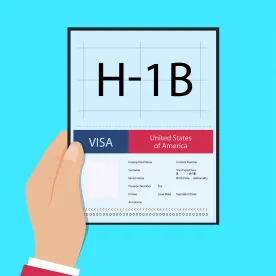U.S. Citizenship and Immigration Services (USCIS) released guidance on the FY2023 H-1B lottery process. Despite attempts to change the structure of the lottery selection process, the Service announced that it would continue with a random-selection lottery for 2022. The registration system will be open from 12 p.m. ET March 1, 2022 until 12 p.m. ET March 18, 2022. The application fee will continue to be $10 for each case entered into the system.
Why is H-1B Filing Season Important?
This is the only time of year (with minor exceptions indicated below) USCIS accepts H-1B specialty worker petitions for the next fiscal year, which begins Oct. 1, 2022. For a petition to qualify in the H-1B category, the job offered must be a specialty occupation in which a bachelor's degree (or its equivalent) is normally the minimum requirement, and the foreign national employee must hold a bachelor's degree (or its equivalent) in the specialty defined by the position. In some cases, a bachelor’s-level threshold may be met through a combination of the employee’s education and work experience.
There is an overwhelming demand for the annual allotment of 85,000 new H-1Bs. The number of H-1B approvals requested by employers has reached the annual H-1B cap every year for more than 10 years. Last year, USCIS received 308,613 registrations within the new electronic lottery system for 85,000 H-1B slots. If you have an employee who needs a new H-1B visa, it is imperative that you take action during the H-1B filing season or your will have to wait a full year for another opportunity.
Electronic Registration Process in 2022
USCIS will use the same electronic registration system for the 2022 lottery. Employers seeking to file H-1B cap-subject petitions must complete an electronic registration for every case the employer wishes to enter into the H-1B lottery. The online registration period will run from March 1-18, 2022. The registration will require a $10 fee for each case to be entered into the lottery plus basic information about the employer and employee. After the registration period closes, USCIS will conduct a random selection lottery. The lottery selection date has not been announced, but it will occur no later than March 31, 2022. Employers whose cases are selected will then have 90 days to complete and file H-1B petitions with USCIS.
Dinsmore attorneys are available to assist employers in navigating the application process, including completion of the electronic registration and subsequent preparation and filing of selected petitions.
Are There Certain Employees We Should Consider Registering?
Yes, three situations come to mind:
-
Students who hold F-1 visa status and who are working for your organization under a grant of Curricular Practical Training, Optional Practical Training or STEM Optional Practical Training work permission;
-
Certain L-1 Intracompany Transferees or TN (USMCA/NAFTA) workers who work for your organization;
-
Candidates who are not yet working for your organization but whom you have an interest in employing in the near future.
Why F-1 Students?
Some F-1 students may qualify for an Optional Practical Training (OPT) work permission that is limited to one year following completion of their degree. Other F-1 students may be eligible for an additional 24 months of STEM OPT work permission. Either way, OPT is time-limited. Furthermore, some additional students may hold Curricular Practical Training (CPT). CPT authorizes employment off campus while the student is still taking classes. These students may be pursuing their first degree in the U.S., or they may have returned to school for an additional degree following exhaustion of their first round of OPT if they were not selected in the H-1B cap lottery. Bottom line: If you have a student working for you on OPT or CPT, it is worth evaluating if they need an H-1B cap registration.
Why L-1 Intracompany Transferees?
The L-1 intracompany transferee visa category applies to foreign nationals who have been employed abroad in executive, managerial, or specialized knowledge capacities for at least one year with a commonly owned foreign company, and who are in the United States working for the same or a related U.S. employer.
L-1 executives or managers (L-1A) may remain in the United States for a maximum of seven years. Specialized knowledge (L-1B) employees may remain for a maximum of five years. There is no possibility of an extension once the seven- or five-year limit has been reached and the time table to complete the permanent residence process continues to climb, especially for Indian foreign nationals.
Why TN Employees?
While TN workers under the U.S. Mexico-Canada Agreement (formerly known as NAFTA) are not limited in employment duration like their L-1 counterparts, pursuing permanent residence while holding TN status can be problematic. Employers may want to change their TN employees to the H-1B category to facilitate permanent residence (green card) sponsorship.
Are There any Exemptions from the Annual H-1B Cap?
People already counted under the H-1B cap and who need an extension of stay are not subject to the annual limitation. Similarly, people who already hold H-1B status and are transferring to a new employer are exempt from the cap. The annual limitation applies only to people not yet counted against the annual cap. Also, certain types of educational or nonprofit organizations that file H-1B petitions are exempt from the H-1B numerical limitation.



 />i
/>i
